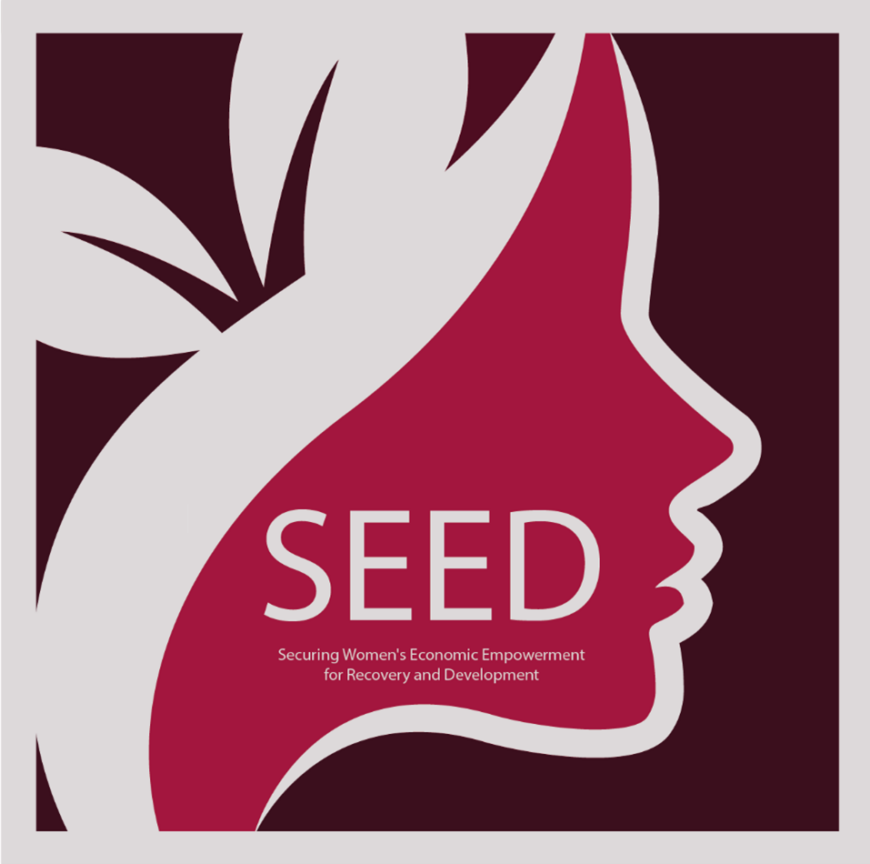Since 2020, with support from Global Affairs Canada, Acted’s Securing Women’s Economic Empowerment for Recovery and Development (SEED) project enhanced women and the most vulnerable and marginalised people’s economic prosperity in Ukraine. Despite the 2022 invasion, SEED expanded from Donetska and Luhanska to reach Volynska, Chernivetska, Vinnytska, Chernihivska, Odeska and Mykolaivska regions through June 2025. The project supported women and other vulnerable groups, especially internally displaced, elderly and rural communities, gain employment, economic security, and resilience. It also strengthened the capacity of local service providers to uphold rights and create opportunities for people to benefit from activities and sectors with economic potential. By tackling barriers to women’s economic participation and leveraging community networks, SEED promoted the continued evolution of traditional norms and practices, in alignment with Canada’s Feminist International Assistance Policy.
Although the war in Ukraine remains an ongoing crisis requiring immediate humanitarian assistance, it is vital to minimise aid dependency and strengthen pathways toward self-reliance and recovery. Sustainable solutions for internally displaced people and conflict-affected communities must help revive local and national economies over the long term. In this context, supporting women and other vulnerable or marginalised groups to rebuild their livelihoods is essential. Providing grants to boost income, subsistence, or food production directly enhances economic security and resilience to future shocks. In addition, widespread damage to local businesses has caused high unemployment, while the closure of schools and childcare facilities has placed an additional burden on women, single parents, and caregivers. Pre-existing gender wage gaps and care responsibilities have also deepened due to the war, pushing more women into informal and precarious work. Therefore, alongside humanitarian relief, targeted efforts to strengthen women’s economic participation and address structural barriers are key to fostering community resilience and driving early recovery in Ukraine.
Enhancing the economic security of the most vulnerable
We received a grant and were able to restore everything thanks to your support. This autumn, we managed to grow cucumbers again, and now we are cultivating tomatoes.
The first objective of SEED was to enhance the economic security of the most vulnerable, through increased access to financial capital for women and the most vulnerable and marginalised (notably the elderly, unemployed pre-pensioners and rural women). As residents of rural areas and small towns in Ukraine are often overlooked by humanitarian responses in favour of major cities, the project addressed this gap by targeting these communities, recognising their remarkable resilience and long-standing tradition of self-sufficiency through small trade, gardening, handicrafts, and home-based production like canning and pickling.
By distributing self-employment grants averaging 53,000 UAH (CAD $1,752) to 1,064 households and offering specialised greenhouse and veterinary training to over 480 participants, SEED boosted vulnerable groups’ livelihoods, improved food security, and injected vital capital into local economies. SEED also awarded small business grants averaging 395,300 UAH (CAD $13,000) to 62 businesses, helping them re-equip, maintain operations, and create or retain jobs, countering widespread war-related job losses. Recognizing that grants alone are not enough, SEED complemented financial support with tailored guidance and referrals to help the most vulnerable building sustainable livelihoods, bridge the widening income gap, and reduce dependence on aid.
Boosting women’s employment access and informed choices for jobseekers and entrepreneurs
Right now, one of the few ways forward for Ukrainian — and especially women-led — businesses is through collaboration and mutual support.
The second objective of SEED focused on boosting women’s access to employment and skills training while equipping jobseekers and entrepreneurs with the information needed to make informed business and career decisions. To contribute to longer-lasting economic prosperity, women’s participation in better-paying sectors and entrepreneurship must be encouraged, addressing gender gaps in occupations and wages. Before the war, only 51% of women were employed, with a persistent gender pay gap of 23%.
SEED advanced this goal by investing in both formal and informal pathways to economic empowerment. The project prioritised high-potential sectors like IT, which offer flexible, well-paid opportunities that allow women to balance care responsibilities. Subsidies for training enabled 508 participants to attend IT courses. Additionally, 52 grant holders and employees of small businesses received up-skilling courses to expand their production or service offerings, and 67 women benefited from re-skilling courses.
As unemployment sharply increased after February 2022, SEED strengthened labor centers to help jobseekers navigate the shifting labour market, focusing on long-term capacity to serve marginalised groups rather than offering direct job placement. Support included equipping 89 branches across six regions with independent job search stations, which have been used by over 10,000 people, and training 770 labor center staff on best practices for advising jobseekers.
Beyond formal employment pathways, SEED promoted entrepreneurship by partnering with 11 local women’s civil society organizations (CSOs) to establish Business Advisory Centers (BACs). These BACs offered in-person and online mentoring, legal and financial consulting, marketing and business planning guidance, and personal development workshops. The BACs supported over 3,600 women and marginalised groups build confidence, overcome wartime challenges, and successfully launch or grow businesses. By combining grants with training, mentoring, and local support, SEED empowered women and vulnerable groups to use financial aid effectively.
Reducing gender and age specific barriers to economic participation
The daycare center gives women the opportunity to take care of themselves and handle daily responsibilities without worry.
The third objective of SEED was to reduce gender- and age-specific barriers to economic participation, ensuring that the first two objectives remain sustainable for women and girls in Ukraine. Canada’s Feminist International Assistance Policy highlights that redistributing family responsibilities and empowering women and girls benefits families and economic growth in their communities and countries. Globally, disproportionate share in domestic and care work limits women’s economic participation. In Ukraine, these challenges have intensified since the full-scale invasion, due to displacement and closures of kindergartens and schools lacking bomb shelters. Persistent stereotypes that women should stay home while men work further limit women’s employment options. IMPACT Initiative’s Economic Participation Assessment (EPA) in Chernivetska and Volynska regions confirmed that more women now cite caregiving and unpaid household work as their primary employment status compared to before the war. In this context, daycare and other essential social services are critical to reducing these barriers.
To address this, SEED awarded 23 grants to expand or improve free daycare services. Priority went to CSOs and local authorities that could provide additional resources, such as municipal buildings or qualified staff, ensuring strong local ownership and long-term sustainability. This support helped daycare centers increase their capacity and quality of care, benefitting working parents, particularly women, and caregivers for the elderly and people with disabilities. To reduce barriers and shift norms, SEED’s “Rebuild Ukraine” education campaign reached over 10,800 students, promoting careers in traditionally male-dominated fields to drive Ukraine’s recovery like engineering, urban planning, and heritage conservation. By encouraging girls to explore these high-demand professions, the campaign fostered a generational change in attitudes toward women’s career possibilities. Lastly, SEED strengthened labor centers and CSOs by training staff on gender and age bias, improving support for jobseekers and addressing employment risks, especially in conflict settings.
Through the SEED project, Acted strengthened the economic prosperity of over 74,000 vulnerable and marginalized people in Ukraine, including more than 48,000 women and girls.
“I have ambitious plans. I want to grow this business, keep learning, create new jobs, pay taxes, and contribute to the development of our country.” — Valeria, small business grant beneficiary, Odesa, Odeska region
“We hope for a good harvest and plan to rebuild the rest of our greenhouses on our own.” — Svitlana, self-employment grant beneficiary, Voznesensk, Mykolaivska region
SEED helped dismantle structural barriers and promoted equal access to better-paying jobs and entrepreneurship to contribute to a resilient and inclusive economic recovery in Ukraine. SEED’s holistic approach has paved the way for lasting economic opportunities and enhanced self-reliance, ensuring that vulnerable individuals and entire communities have the tools and support they need to thrive well beyond the project’s duration.
Learn more about the project’s impact and meet the people behind these stories in this video:

